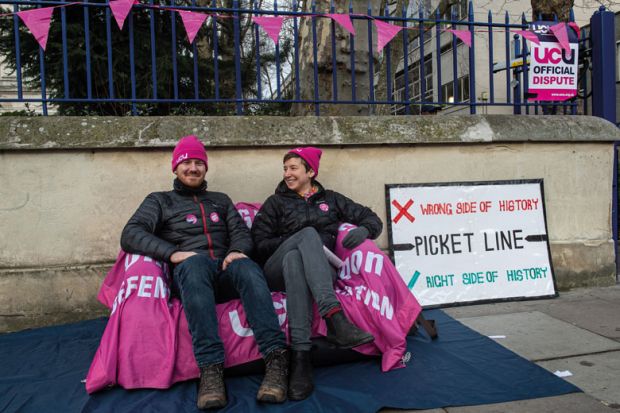Further strikes at UK universities at the start of the new academic year will test the patience of union members and their employers but the stand-off will continue unless both sides are willing to engage in a fundamental rethink of how the sector is organised, according to experts.
The University and College Union (UCU) will hold nationwide strikes in September as its long-running pay dispute with the Universities and Colleges Employers Association (Ucea) continues.
Some fear that the high-profile walkouts – and the union’s marking boycott – is harming the reputation of the sector, already facing a battle to convince students and the wider public of its worth.
Jonathan Simons, head of education practice at the thinktank Public First, said the stress and angst caused to students and their families had been a “terrible error” at a “time when universities need friends in public opinion”.
Mr Simons said he felt that the problems lay in the sector’s continuing attempts to collectively negotiate pay.
“Ultimately, it may be time to recognise that we can’t have a system of national bargaining across a diverse sector”, he said. “It would serve academics, professional staff, universities and, crucially, students better if we had greater flexibility and local bargaining.”
UCU members are not taking the action lightly, said Dyfrig Jones, senior lecturer in film at Bangor University and a member of the union’s national executive committee. Many will have “mixed feelings because no one wants to cause harm to the students nor lose pay”.
“But I think that we need to send a message to the employers that it’s possible to resolve this dispute now, rather than let it roll on into the next academic year. The best way of avoiding this is for Ucea to make us an improved offer, which would allow us to call off the planned strike dates in September,” he added.
The employer body has stuck to its position that the sector as a whole cannot afford further pay rises, while declining to advise institutions to refund those who have had pay deducted for participating in the boycott.
It said this week it was waiting for a response from the unions on restarting Acas-facilitated talks on a review of sector finances and other pay related matters which it said was “unfair on those students yet to graduate, who are bearing the repercussion of their delay.”
Dr Jones said that the “crisis” in higher education was ultimately caused by a “complete failure of central government” and “you would like to think that the union and the employers’ associations would be able to work together to try and shape a collective vision for how we can change this under a new government”.
UCU has announced its intention to re-ballot members on whether to take further industrial action when its mandate expires at the end of September.
The union will “probably receive enough votes to carry on boycotting”, said Roger Seifert, emeritus professor of industrial relations at the University of Wolverhampton. But members will also be “worried by lack of progress”.
The employers, he added, are “in confused panic while collectively involved in bitter internal wrangles” and now face added pressure from the government, which has been pushing for a settlement.
“The sticking point is the lack of overall strategic direction for the sector,” he said. “This frightens UCU members looking for long-term careers, and renders v-cs paralysed as risk-avoiders and members of the short-term target-hitting brigade.”
Gregor Gall, visiting professor of industrial relations at the University of Leeds, said the composition of the union’s key decision-making committees will mean it keeps pushing for escalating action and the national leadership will struggle to convince members to accept a deal that falls short of its original objectives, as other unions have been able to do.
“It is likely the patience of the membership will wane much more than it already has”, Dr Gall said, adding: “This means that whenever and however the dispute ends, it will be a messy, divisive and debilitating one for the union.”

